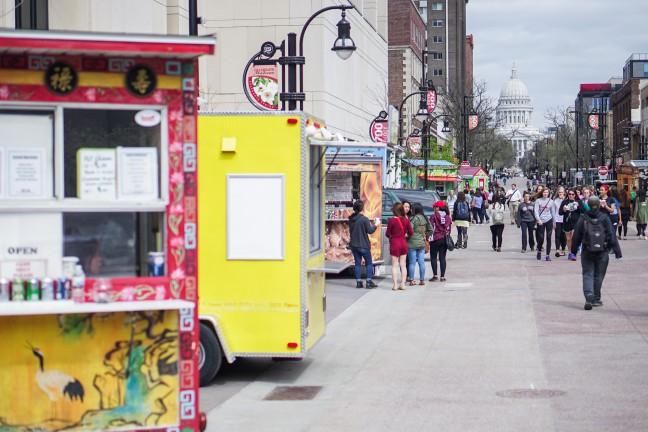The COVID-19 pandemic significantly altered the typically bustling food truck business, with more than half of the food trucks available last year either closed or no longer conducting business.
In a normal year, Library Mall and Capitol Concourse are filled with food trucks. In 2019, 43 food trucks participated in Madison’s annual review, a requirement for food trucks wanting to sell at these two locations.
Owner of Caracas Empanadas and Caracas Arepas food trucks, Luis Dompablo, discussed the devastating financial impact of the pandemic.
State Street businesses suffering pandemic-related losses prepare for winter
“Financially, it’s pretty bad,” Dompablo said. “We are probably 70% lost in the year.”
The Caracas Empanadas food truck, which sells Venezuelan street food, occasionally has good business days, Dompablo said. In 2019, the food truck ranked the seventh-best food truck in Madison.
Caracas Arepas, on the other hand, struggles more. Since it’s a newer establishment, Dompablo said fewer people seek out the food truck. Here, Dompablo serves traditional Venezuelan corn cakes filled with meat, plantains, beans and cheese.
Co-founder of Toast food truck, Gili, who was only comfortable providing his first name, reflected a similar sentiment.
Restaurants make alterations to business model, community supports local businesses
“The pandemic and everything killed all my business,” Gili said.
Prior to the pandemic, Gili said he would attribute the success of the panini food truck to the busy lunch-time crowd. Now, because most classes are online and less students are leaving their buildings, the food truck is no longer a popular stop for a quick lunch break. The loss of business caused many owners to significantly reduce the number of days the food truck is open for business.
Unlike other food trucks, the owner of Fresh Cool Drinks food truck Tsui has consistently conducted business at Library Mall. For privacy reasons, Tsui identified herself by only her first name. Fresh Cool Drinks sells large, Thai spring rolls as well as smoothies and juices.
Tsui said her business suffered major losses with campus activity disappearing in March and not returning for the rest of the spring and summer. The start of the fall semester helped slightly, but the business is still feeling the effects of the pandemic, she said.
City officials, experts strive to provide resources to aid struggling businesses
Like Tsui, both Dompablo and Gili said in a standard year, despite the end of the academic year in May, the food truck still does well, financially.
“When times are normal, it slows down over the summer, but it’s not terrible,” Dompablo said.
“We have quite a bit of visitors,” Gili added. “Summer classes, it’s still something.”
This summer, with no in-person classes or traveling families, Gili said Library Mall and Capitol Concourse were empty.
To ease the financial devastation and adapt to the pandemic, Caracas Empanadas and Caracas Arepas first transitioned from selling at Library Mall to selling at Capitol Concourse. Dompablo said he then added a delivery service.
They can now be found on Eat Street, Uber Eats, GrubHub and Christine’s Kitchen. Despite the supplemental service, Dompablo said not enough people have utilized Caracas Empanada’s take-out option. He said he hopes more people will begin to use their delivery service with the start of football season, though the season opener, on Friday, Oct. 23, did not increase business.
Dane County 2021 budget initiative includes $2 million for minority-owned businesses
“If you’re going to order out, look at us,” Dompablo said. “It’s quality food, and it’s delicious. Try us out, and give us a chance.”
Dompablo said the Caracas Empanadas and Caracas Arepas food trucks ordinarily carry out most of their business in the spring, summer and fall. The food trucks close in the winter and open again in March, when the weather is warmer. Similarly, Toast and Fresh Cool Drinks typically open from the months of May through October.
In 2020, however, the food trucks reopened to extremely different circumstances, with students sent home on March 23 and not returning until August for the new school year.
With its primary customer base at home for about five months, Gili said Toast was forced to close for several months between March and August.
Around this time of year, the food trucks benefit from football season — or the extra spending of traveling families and students.
“People come from out of town before the game, and we sell at the farmers market, and people come to tailgates,” Dompablo said. “Nobody is going to the stadium, and the bars are closed.”
For financial support, the remaining food trucks encourage students and anyone in the Madison area to visit them while the weather permits them to operate. Approximately five to six food trucks are open for business Monday through Friday at Library Mall. Additional trucks can be found at Capitol Concourse on weekdays.













